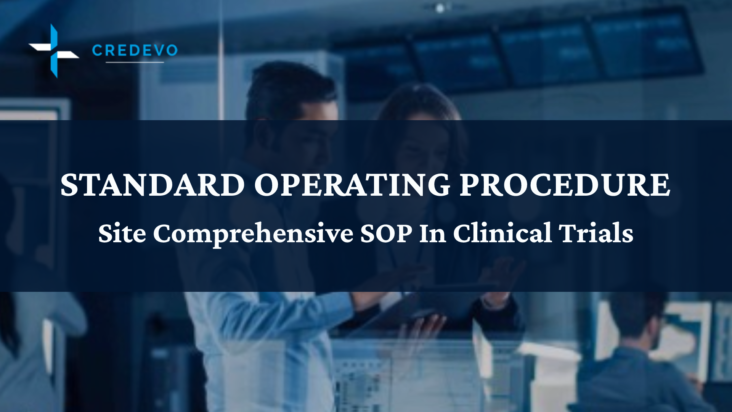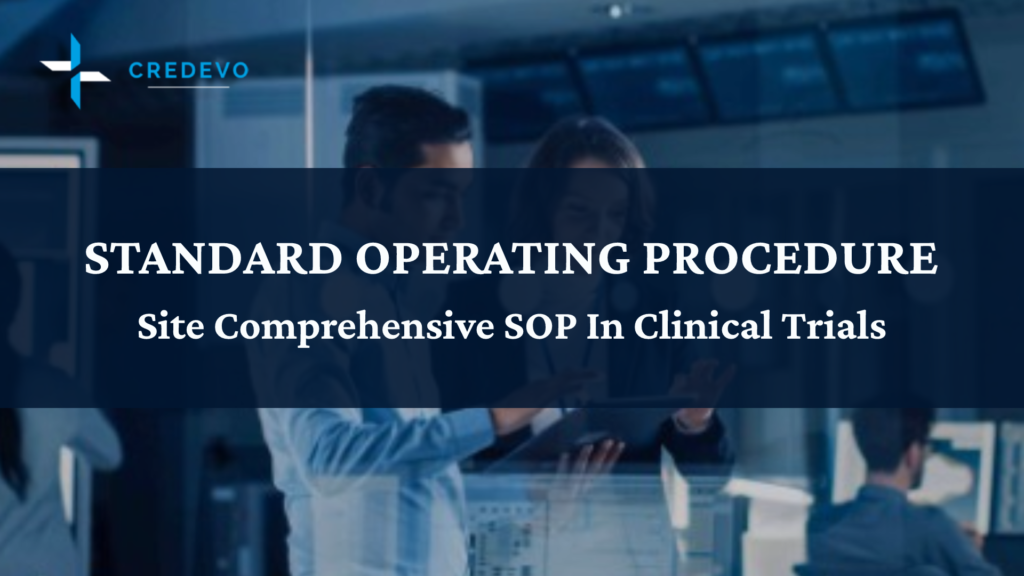Comprehensive Site SOP for Clinical Trials: Standardizing Processes for ICH GCP Compliance

A comprehensive site SOP for clinical trials is a detailed and all-encompassing document. It outlines the standardized procedures and guidelines to ensure adherence to the ICH GCP guidelines within a clinical trial site.

A Site SOP establishes a specific set of standardized procedures and guidelines for a particular clinical trial site. It aims to ensure consistency, accuracy, and compliance with regulations and protocols throughout the trial.
Before going into the details let’s first understand the different types of SOPs used at the clinical trial sites.
What are the different types of SOPs used at the clinical trial site?
There are basically two types of SOPs that clinical trial sites usually use.
- Single comprehensive SOP
- Individual SOPs for each specific process or activity
The approach to developing SOPs can vary between different clinical trial sites. While some sites may choose to have a single comprehensive SOP that covers all processes, others may opt for individual SOPs for each specific process or activity within the clinical trial.
Single comprehensive SOP
A single comprehensive SOP (Standard Operating Procedure) in clinical trials refers to a document that combines multiple procedures and guidelines into one unified framework. It serves as a comprehensive guide for conducting various aspects of a clinical trial, ensuring consistency and adherence to regulatory standards.
Having a single-site SOP can provide a consolidated and standardized approach to the overall trial conduct at the site. Ensuring that all site staff are following the same set of procedures and guidelines, promotes consistency and reduces the risk of errors or inconsistencies.
Get the Site SOP for use at the clinical trial site.
Note: This report will be charged @ $249.
Individual SOPs for each specific process or activity
Individual SOPs for each specific process or activity in clinical trials are documents that provide detailed instructions and guidelines for conducting a particular task or activity within the trial. These SOPs focus on specific procedures, processes, or activities and provide step-by-step guidance to ensure consistency, accuracy, and compliance with regulatory requirements.
This approach can be particularly useful when different processes require specific expertise or when there are distinct requirements for various aspects of the trial. It allows for greater flexibility in addressing specific requirements and variations across different trials or protocols.
Which type of SOP do you need to choose for your site?
The choice between a single site SOP or individual SOPs for each process often depends on factors such as the
- complexity of the trial,
- size of the site,
- availability of resources, and
- preferences of the site personnel and trial sponsors.
Both approaches can be effective in ensuring compliance with ICH GCP guidelines. They must adequately address the necessary procedures, responsibilities, and regulatory requirements associated with the conduct of the clinical trial.
What are the advantages of using single-site SOPs?
Having a single-site SOP for clinical trial sites offers several advantages:
Consistency and Standardization:
A single-site SOP ensures that all site staff members follow the same standardized procedures and guidelines throughout the trial. This promotes consistency in processes, reduces variations, and minimizes the risk of errors or deviations.
Simplicity and Ease of Use
A single SOP simplifies the documentation and training process. Site personnel only need to familiarize themselves with one comprehensive document, making it easier to understand and implement the procedures. It saves time and effort in managing and maintaining multiple SOPs.
Comprehensive Coverages
A single-site SOP can cover all the necessary activities and processes involved in the clinical trial. Within a single document, it provides a holistic view of the trial operations, ensuring that all crucial aspects are addressed. This reduces the chances of overlooking or missing important procedures.
Cross-functional Understanding
A single SOP facilitates better understanding and collaboration among different site staff members and functions. Since everyone follows the same procedures, it promotes a common language and knowledge base among personnel involved in different aspects of the trial. This can enhance communication, teamwork, and overall efficiency.
Streamlined Updates and Revisions
Managing updates and revisions become more streamlined with a single site SOP. One document can implement changes, ensuring that all site staff members have access to the updated information simultaneously. This helps maintain compliance with evolving regulations, guidelines, or study-specific requirements.
Audit and Inspection Readiness
Having a single-site SOP simplifies the preparation and review process during audits or inspections. Regulatory authorities or sponsors can easily review and assess the site’s adherence to the established procedures. This is possible because the procedures are consolidated into a single document.
Cost and Resource Efficiency
Developing and maintaining a single site SOP can offer greater cost-effectiveness and resource efficiency compared to managing multiple individual SOPs. It reduces the time and effort required for documentation, training, and quality control activities associated with SOPs.
What details does a Site SOP include?
A Site SOP typically includes detailed instructions on various aspects of the clinical trial operations at the site. This can include:
Study-specific procedures: These are specific to the particular clinical trial being conducted at the site. They outline the steps and guidelines for subject recruitment, enrollment, screening, and follow-up visits.
Documentation and record-keeping: Site SOPs provide instructions on how to properly document and maintain essential trial-related documents. These documents include informed consent forms, case report forms, source documents, and other regulatory documents. This ensures that all necessary records are accurately completed, organized, and archived.
Study drug management: If the trial involves investigational drugs, the Site SOP will outline the procedures for drug storage, dispensing, accountability, and reconciliation. This helps ensure the integrity and safety of the study drug throughout the trial.
Adverse event reporting: The SOP will detail the process for identifying, documenting, and reporting adverse events or other safety concerns that occur during the trial. This includes timelines, reporting requirements, and communication channels to inform the appropriate stakeholders.
Quality control and monitoring: Site SOPs often include instructions for quality control activities, such as internal audits, monitoring visits, and data validation checks. These procedures help maintain data integrity and ensure compliance with Good Clinical Practice (GCP) guidelines.
Compliance with regulations and ethics: Site SOPs provide guidance on adhering to applicable regulations, guidelines, and ethical considerations. This may include procedures for obtaining and maintaining ethical approvals, protecting subject confidentiality, and ensuring informed consent processes are followed.
What details should be present in a Site SOP as per the ICH-GCP guidelines?
To claim compliance with International Conference on Harmonisation – Good Clinical Practice. (ICH GCP) guidelines, a Site SOP should encompass various activities performed at the site. While the specific details may vary depending on the trial and site-specific requirements, here are some key components that should typically be covered:
Investigator responsibilities
The SOP should outline the responsibilities of the principal investigator (PI) or site investigator, including their role in ensuring the rights, safety, and well-being of trial participants, adherence to the protocol, and overall trial management.
Protocol adherence
The SOP should describe the procedures to ensure that all activities at the site align with the approved study protocol. This includes participant recruitment, screening, enrollment, randomization (if applicable), study interventions, data collection, and follow-up visits.
Informed consent process
The SOP should provide instructions on obtaining informed consent from trial participants, ensuring that they have received all necessary information, have had their questions addressed, and have voluntarily provided their consent. It should also specify the documentation and retention requirements related to informed consent.
Regulatory compliance
The SOP should detail procedures to ensure compliance with relevant regulatory requirements, including obtaining necessary approvals from ethics committees and regulatory authorities. It should address the submission of required documentation and subsequent updates or amendments.
Safety reporting and adverse event management
The SOP should describe the process for identifying, documenting, assessing, and reporting adverse events and serious adverse events. It should include clear guidelines on the reporting timelines, documentation requirements, and communication channels with the sponsor, ethics committees, and regulatory authorities.
Data management and quality control
The SOP should outline procedures for accurate and timely data collection, entry, verification, and maintenance. It should cover source data verification, data validation, data confidentiality, and archiving of trial-related documents.
Monitoring and audit procedures
The SOP should provide instructions for internal and external monitoring visits, audits, and inspections. It should outline the responsibilities of the site personnel during these visits, including access to source documents, data verification, and addressing any findings or queries.
Training and qualification
The SOP should address the training requirements for site personnel involved in the trial. This includes initial training on GCP, protocol-specific training, and ongoing training to ensure personnel are adequately qualified to perform their roles.
Document control
The SOP should cover procedures for document management, including version control, distribution, and archiving of essential trial documents, such as the protocol, investigator brochure, and informed consent forms.
Ethics and subject protection
The SOP should emphasize the importance of protecting the rights, safety, and well-being of trial participants. It should detail procedures for confidentiality, privacy, and handling of participant data.
In alignment with the specific requirements of the trial, institutional policies, and applicable regulations, stakeholders typically develop Site SOPs. It is essential to regularly review and update them as needed to reflect any changes in the trial or regulatory landscape.
Do you have any questions or need our support?
Our expert team meticulously crafts SOPs that are tailored to meet the specific needs of each trial, ensuring ICH GCP compliance and standardized processes. We offer a valuable service that promotes operational efficiency, regulatory adherence, and participant safety. Click on the download button above to access the comprehensive site SOP for your clinical trial site.
If you have any questions or if you are looking for any specific SOP for your site, please provide your requirements details below. We will connect with you to discuss and explore our expertise.